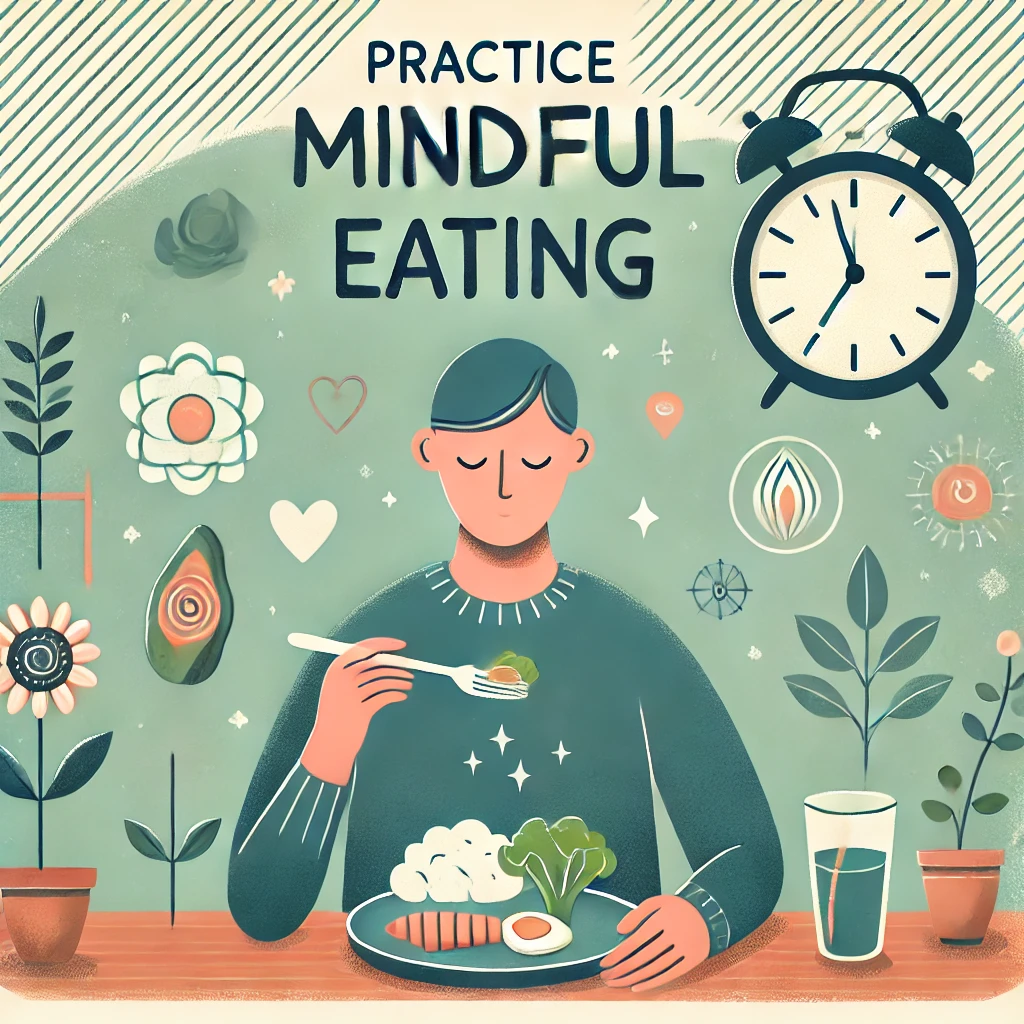Maintaining your weight while enjoying your favorite foods might seem challenging, but it’s entirely possible with the right strategies.
In this article, we’ll explore effective techniques backed by recent studies to help you avoid weight gain without sacrificing the foods you love. From mindful eating to intermittent fasting, we’ll cover every detail you need to know.
The Fundamentals of Weight Management
Weight management boils down to the simple equation of calories in versus calories out. To maintain your weight, you need to balance the number of calories you consume with the number you burn.
This balance can be affected by factors such as your metabolism, activity level, and dietary choices. However, you can still enjoy your favorite foods by implementing the following strategies:
1. Practice Mindful Eating

Mindful eating involves being fully present during meals, savoring each bite, and listening to your body’s hunger and fullness cues. According to the Experts, slowing down and truly enjoying your food can lead to greater satisfaction and a reduction in the likelihood of overeating. For example, savoring a small piece of chocolate can satisfy a craving without consuming large quantities.
2. Increase NEAT (Non-Exercise Activity Thermogenesis)
NEAT refers to the calories burned through everyday activities such as walking, cleaning, or even fidgeting. It can account for a significant portion of your daily energy expenditure. Increasing NEAT can be as simple as taking short walks during the day, using the stairs instead of the elevator, or standing up more often while working.
3. Intermittent Fasting
Intermittent fasting (IF) can help you enjoy your favorite foods while controlling calorie intake. This eating pattern involves cycling between periods of eating and fasting. A popular method is the 16:8 plan, where you fast for 16 hours and eat during an 8-hour window. Studies have shown that IF can help reduce calorie intake, improve metabolism, and even support weight loss.
4. Opt for Healthier Versions of Your Favorite Foods

You can still enjoy comfort foods by making healthier choices. For example, instead of deep-frying foods, try air-frying or baking. Swap high-calorie ingredients with healthier alternatives like using fruit as a natural sweetener instead of sugar. Small tweaks can significantly reduce calorie intake while preserving flavor.
5. Control Portions with the 80/20 Rule
The 80/20 rule allows you to eat nutritious foods 80% of the time and enjoy indulgent foods 20% of the time. This strategy prevents feelings of deprivation and promotes long-term adherence to a healthy eating plan. It’s about balance, not restriction, which makes it easier to maintain your weight while still enjoying occasional treats.
6. Track Your Food Intake
Keeping track of what you eat can increase awareness of your eating habits. You don’t need to do it forever, but logging your meals for a few weeks can help identify patterns that lead to overeating. Use apps to record your meals or simply jot down what you eat in a journal.
7. Read Nutrition Labels Carefully

Food labels can be deceptive. Terms like “fat-free” or “low-sugar” might make foods seem healthier than they are. Always check the nutrition facts panel for hidden sugars and fats. Aim for a diet high in protein and fiber, which can help you feel fuller for longer.
8. Exercise Regularly
Exercise is crucial not just for weight loss but for overall health. It can help offset the calories consumed from your favorite foods. Even light physical activities like walking or yoga can make a difference. Regular exercise also supports a healthy metabolism and reduces the risk of weight regain.
9. Manage Stress and Sleep
Stress and lack of sleep can lead to overeating and weight gain. Practice stress-management techniques like meditation, and ensure you get enough sleep to keep hunger hormones in check. A well-rested body is less likely to crave high-calorie comfort foods.
10. Time Your Meals Wisely

Eating your meals at regular intervals and avoiding late-night snacks can help maintain a healthy weight. Try to finish eating a few hours before bedtime to give your body time to digest. A consistent eating schedule can also help regulate your metabolism.
Strategies to Enjoy Your Favorite Foods Without Gaining Weight
| Strategy | Details |
|---|---|
| Mindful Eating | Eat slowly, savor each bite, and listen to hunger/fullness cues. |
| Increase NEAT | Add more movement to your day through non-exercise activities. |
| Intermittent Fasting | Restrict eating to certain windows, like the 16:8 method. |
| Healthier Food Choices | Swap ingredients and cooking methods for healthier versions. |
| 80/20 Rule | Eat healthy foods 80% of the time and indulge 20% of the time. |
| Track Food Intake | Use apps or journals to log your meals and identify patterns. |
| Read Nutrition Labels | Check for hidden sugars and fats, prioritize protein and fiber. |
| Exercise Regularly | Engage in regular physical activity to balance calorie intake. |
| Manage Stress and Sleep | Reduce stress and get enough sleep to avoid emotional eating. |
| Time Your Meals | Eat at regular intervals and avoid late-night snacks. |
Conclusion
Avoiding weight gain while enjoying your favorite foods is achievable with mindful eating, regular physical activity, and smart dietary choices.
By balancing indulgences with healthy habits and staying active, you can maintain your weight and still enjoy the foods you love. Remember, moderation and consistency are key to long-term success.
FAQs
1. Can I eat dessert every day and still maintain my weight?
Yes, if you practice moderation and balance your overall calorie intake. You can enjoy small portions of your favorite desserts without impacting your weight.
2. What is the best exercise to prevent weight gain?
Any form of regular physical activity, such as walking, running, or strength training, can help. The key is consistency.
3. How does stress affect weight gain?
Stress can trigger emotional eating and cravings for high-calorie comfort foods. It can also disrupt sleep, leading to further weight gain.
4. Is intermittent fasting safe for everyone?
Intermittent fasting can be safe for most healthy individuals, but it’s always best to consult a healthcare professional before starting any new diet plan.
5. How much water should I drink daily to help manage my weight?
Aim for at least 8 cups (2 liters) of water daily. Staying hydrated can help control hunger and prevent overeating.



